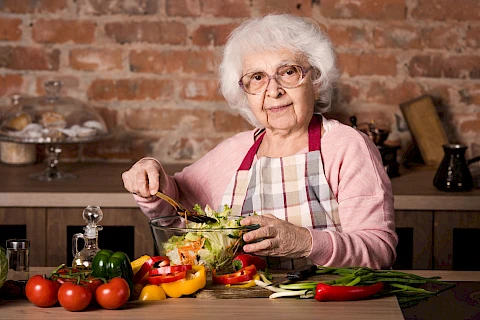
Fiber nutrition for seniors is an essential component of a healthy diet. As we age, our bodies change, and so do our dietary needs. It is a vital nutrient we should never underestimate. Having a good grasp of the role of fiber in our diet can significantly influence our wellness and overall health.
What Is Fiber?
Learning about fiber nutrition for seniors is essential. Fiber, a type of carbohydrate, cannot be broken down into sugar molecules, allowing it to pass through the body undigested. This process helps regulate sugar use, hunger, and blood sugar levels. There are two types of fiber:
- Soluble fiber, which dissolves in water and lowers glucose and cholesterol levels, and
- Insoluble fiber, which promotes digestive regularity and prevents constipation.
Overall, it supports gut health, aids in weight management, and reduces inflammation.
Why Golden-Agers Need More Fiber
As we age, our digestive systems slow down, making fiber important in maintaining regularity. But it does more than aid digestion. It supports heart health by lowering cholesterol, stabilizes blood sugar levels, and can even help with weight management due to its satiating effect. A diet high in fiber can reduce the risk of developing chronic diseases prevalent among seniors, such as type 2 diabetes and certain types of cancer. Fiber is a small dietary addition that offers significant benefits.
How to Gradually Increase Fiber Intake
It is best to gradually increase your consumption to avoid digestive discomfort such as bloating, gas, or cramping. Do this by adding fiber-rich foods slowly and drink plenty of fluids to help it work effectively. Consider using a food diary or app to track your intake, aiming for 25-30 grams of fiber daily based on your health needs.
Approachable Sources of Fiber
Incorporating fiber-rich foods into your meals doesn't have to be challenging. Here are some easy ways to boost your intake:
- Start your day with whole grain cereals or oatmeal topped with fruit like berries or bananas. These tasty options provide essential nutrients and support fiber nutrition for seniors.
- Lunch: Choose whole-grain bread for sandwiches. Pair with fiber-rich soups or salads featuring legumes like lentils or chickpeas for a hearty, healthy meal.
- Dinner: Incorporate vegetables as a staple, paired with whole grains like brown rice or quinoa, and add beans for protein and fiber.
- Snacks: For between-meal nibbles, choose nuts, seeds, or fiber-rich fruits like apples, pears, and oranges. These no-prep options pack a nutritional punch.
We Can Help Enhance Fiber Nutrition for Seniors
The positive aspects of incorporating more fiber into one's diet are extensive. It is a dietary powerhouse that improves digestive health, aids in weight management, and reduces the risk of chronic diseases. Start small and gradually increase intake to help your digestive system adjust. For those in Peachtree City, Atlanta, Newnan, and Fayetteville, reach out to us at Senior Helpers Peachtree City for personalized dietary guidance and support on your journey to healthier eating today.